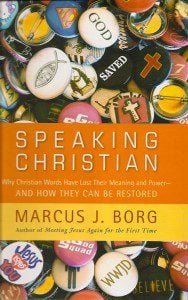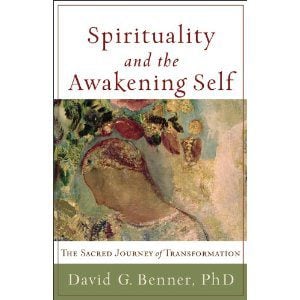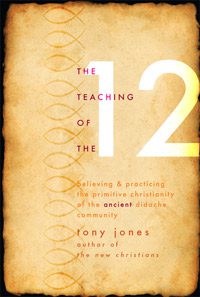The introductory post to this blog series is available here.
The highlights from Diana Butler Bass’ first lecture are available here.
My musings on the lectures are in brackets.
Marcus Borg’s first lecture (of three total lectures) was on “Reclaiming Christian Language.” He began by reminding us that his work is done in the hope of inspiring “adult theological re-education.”
- The American Lutheran theologian George Lindbeck (1923-) wrote a landmark book in 1984 on The Nature of Doctrine: Religion and Theology in a Postliberal Age. Therein, he spoke of religions as “cultural-linguistic traditions.” More simply, we can say that the word Christian is shorthand for “speaking Christian” (hence the title of Borg’s latest book). Religions are like languages.
- Anyone born in 1964 or later grew up in a time when “church” was no longer the dominant norm. U.S. citizens have been increasingly unchurched in recent decades, especially in the Pacific Northwest, where Borg taught as a religion professor for many years. The unchurched have little familiarity with Christian language.
- For example, Borg used to give the following assignment on first day of class: “Free associate on the topic of ‘Me and Christianity.’ What do you think of first?” He would often get responses such as, “I think there’s a story in there about a guy and a fish,” presumably an allusion to Jonah being swallowed by a whale or “big fish.” Or a student once said, “Christians are really against trespassing,” perhaps either a reference to the Lord’s Prayer or, perhaps even more likely, to all the church properties with “No Tresspassing” signs. [So much for the Christian practices of hospitality or welcoming the stranger!]
- The upshot of this trend toward the unchurched is that Christian language is becoming a foreign language and misunderstood language. For example, two-thirds of Christians don’t know the Beatitudes are only in the Gospel of Matthew. Many people mistakenly think that the line, “God helps those who help themselves” is in the Bible.
- There has also been a problematic Literalization of Christian Language. This perspective assumes that, “everything the Bible says is the literal, factual, and absolute revelation of God. If the Bible says something happened, then it happened. If the Bible says something is wrong, then it’s wrong.” Doctrines of innerancy and infallibility are linked to this view. Example: Genesis creation account vs. evolution
- However, both biblical inerrancy and literalism are modern views; they are neither ancient, nor traditional. But if your provinciality has never been challenged, you mistakenly think you “know” a lot of stuff — again, the need for adult theological re-education. [James Kugel makes this point extremely well in his book How to Read the Bible: A Guide to Scripture, Then and Now.]
(Perhaps this photo is unfair, but there was a clear liberal bent in the lectures and crowd.)
- Toward an Understanding of Christianity’s Core Message. A memory exercise: At the end of childhood (approximately age 12), imagine you had been asked to state the heart of the Christian message (“the Gospel,” the “Good News”) in a sentence. [Something Tweetable.] Why does Christianity matter? What should you or anybody be a Christian? Take 3-4 minutes of silence to imagine yourself at this age, then journal your response.
- Borg’s one-sentence, childhood answer: Jesus died for our sins so that we could be forgiven and go to heaven if we believe in him. (Emphasis: afterlife, our sinfulness, Jesus’ death, believing. This view is “Heaven and Hell Christianity” or “Belief-centered Christiainity.” [Remember Bass’ point from her first lecture that, “There was a ‘divorce’ (so to speak) in first half of twentieth century in U.S. Christianity. In the divorce settlement (as it were), fundamentalists took experience and liberals took intellectualism. In this religious split-up, liberals got custody of the head, whereas evangelicals and pentecostals got custody of the heart. The problem is that all Christians need BOTH.”]
- Words usually do not have precise meaning in isolation. They derive their meanings within contexts, within frameworks. For example, the word “elephant” means something different in the context of a zoo, a poem, and a political cartoon respectively.
- Within the framework of Heaven-and-Hell Christianity the following underlined words have the noted connotations. BUT the full biblical account of these words is often different:
- Salvation = “eternal life”
- Saved implies “from our sins.” BUT in the Bible these words seldom have those meanings. Rather, salvation is about deliverance and transformation.
- Sacrifice = Jesus’ death on the cross as payment for our sins. BUT in the bible, sacrifice is never about substitutionary payment for sins.
[Although I strongly support a move away from substitutionary atonement theology such as in Rebecca Ann Parker and Rita Nakashima Brock’s important books, I’m dubious about Borg’s “never” in that statement. See, for example, The Death and Resurrection of the Beloved Son: The Transformation of Child Sacrifice in Judaism and Christianity by Jon Douglas Levenson. I would say, instead, that we should acknowledge (and disavow) all the problematic passages in the Bible such as Philip Jenkins describes in his important recent book Laying Down the Sword: Why We Can’t Ignore the Bible’s Violent Verses. I do, however, appreciate and support, as far as I can, Borg’s work to highlight the many exemplary passages in scripture as well as to brilliantly reinterpret many of the problematic passages.
- When I asked Borg to clarify his claim that “sacrifice is never about substitutionary payment for sins,” he addressed three examples:
- Regarding the ‘scapegoat’ passages, such as in Leviticus 16, it would have been sacrilege to offer a sin-laden sacrifice to God. [Borg makes a good point here, but I would still argue that the goat is being ‘sacrificed’ for sin, even if not directly sacrificed to God. Casting out a domesticated goat into the wilderness was almost certainly a death sentence. The goat would in all likelihood have been eaten quickly by predators.]
- On Mark 10:45, which says, “The Son of Man came not to be served but to serve, and to give his life a ransom for many,” Borg offered the empire-critical reading that the ‘ransom’ in question was the ‘price to be paid to free from slavery’ — that is, to expose the corruption of the Roman Empire’s unjust killing of Jesus. [Again, I’m impressed, but not fully convinced of this interpretation.]
- The book of Hebrews, as a whole, is ultimately about subverting the sacrificial system (saying, “You don’t need that anymore.) It is not about how sacrifice is required, but about a paradigm shift. [I again understand what Borg is trying to do, although I’m not ultimately convinced if he actually redeems Hebrews for me. But moves such as this one need to be taken trepidatiously because they can unintentionally be heard as anti-Jewish and supercessionist. I trust that Borg did not intended to be anti-Jewish, but Borg’s collaborator John Dominic Crossan is clearer on this point: Jesus was “not against the Temple as such, and not against the high priesthood as such. It was a protest from the legal and prophetic heart of Judaism against Jewish religious cooperation with Roman imperial control.” In these days of Occupy Wall Street protests, it is significant that Crossan continues to say that Jesus’ way is “against any capital city’s collusion between…religion and imperial violence at any time and in any place” (God and Empire: Jesus Against Rome, Then and Now, 132). Serendipitously, on the same evening as Borg’s lecture, I saw a tweet of a related quote from Crossan speaking across the country at the annual American Academy of Religion / Society of Biblical Literature conference: “unity of x-n Bible needs to be rethought. What theology holds it together? #sblaar.” Borg is right on need for adult (progressive) theological re-education, but on this particular evening he was playing a bit too fast and loose with “What Bible ‘Really’ Says” from my perspective.]
- Redeem/redeemer/redemption = Jesus redeems us from our sins. BUT the Bible, refers to liberation from slavery/bondage.
- Repentance = contrition about sins BUT in the Bible is return/re-connection and going beyond the mind that you have.
- Reighteousness and righteousness = rigorous individual moral vitue. BUT in the bible, “just and justice” are central to God’s character and dream for the world.
- Peace = individual and internal. BUT the Bible speaks of peace as the end of war.
- Faith, believing = all literally true. BUT the Bible should be taken seriously, but not literally.
The upshot is that we need to redeem and reclaim Christian language in order to learn to “speak Christian” again.
[Overall, Borg seemed to be, at least in this lecture (as well as in the Question and Response section in which myself and at least one other person asked for clarity on this issue), setting up too firm a binary between the mistaken “Hell-and-Hell Christianity” definition and “What the Bible Really Says,” risking, in my opinion an unnecessary biblical foundationalism. My understanding is that the reality is messier and more complex. I would be more willing to say that the Bible is a sprawling anthology which is simply wrong in some places. On this point, I’m a huge fan of Pedagogy of the Bible: An Analysis and Proposal by Dale B. Martin. Again, I appreciate Borg’s attempts to reinterpret scripture in positive directions. And obviously he is well-published, erudite scholar. But he seemed insistent on playing fast-and-loose with some of the negative parts of scripture in this particular lecture. However, given the tendency of many liberal Christians to abandon the Bible (“throwing the baby out with the proverbial bathwater”), perhaps Borg’s hardline is understandable for the pedagogical purposes of reclaiming scripture for progressive Christianity.]
For more details about each of these bullet-points (and to judge for yourself in regard to these arguments), see Borg’s latest book Why Christian Words Have Lost their Meaning and Power and How They Can Be Restored (2011):
Stay tuned for the next installment on the highlights of Bass’ second lecture in the series.
The Rev. Carl Gregg is a trained spiritual director, a D.Min. candidate, and the pastor of Broadview Church in Chesapeake Beach, Maryland. Follow him on Facebook (facebook.com/carlgregg) and Twitter (@carlgregg).

















